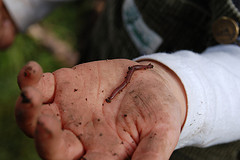Children in the Garden: Worms
I remember contented hours spent with my grandfather in his garden; tying up tomatoes in the greenhouse, asking important questions:
“Where do butterflies go to in the winter?”
“They die because they’re frail, their wings freeze over. But caterpillars manage to survive because of their tough skins.” Pause “You stroked that caterpillar you’d kept from a chrysalis, didn’t you?”
I nodded
“Well, think how that felt compared to the butterflies in the study”“The ones on pins?”
Assenting grunt as a leaf was carefully checked for aphids
“But they’re dead!”
“How are you going to stroke a live one? They always fly away when you try, don’t they?”
“Ye-es”
Some time later, inspecting young sweet peas in their long, root-trainer pots to see if they’re ready to plant out:
“Why do we save toast crusts for the birds?”
“Because there’s not room for a cooker in their nests and how else are they to eat breakfast?”
“What about worms?”
“What about them?”
“I thought birds ate them”
“The ones who get up early like your Grandmother do”
“But the others have toast like you?”
A smile, “yes, like me” knowing the next question
“Does Grandma eat worms for breakfast then? She had porridge yesterday with me”
A chuckle “Well, I didn’t say for sure she ate worms – although they’re probably full of protein. Come on, little one, I think it’s time for elevenses” checking his fob watch “Will there be shortbread do you think?”
“No, Grandpa, because we’re baking this afternoon.”
An impish smile, reflected in both faces “But there might be worms on toast!”
Worms on toast may be a dish to delight a Robin, but for us gardeners we’d prefer they were safely in the earth doing their important tasks that make our soil fit to grow wonderful flowers and fruit.
So why are worms so important? Briefly, their burrowing in the soil to move around creates channels for air to circulate and water to drain through. This is especially important for those who garden on heavy, clay type soils. Plants need air at their roots in order to breathe and they need water; soil air and soil water fit in the spaces between the soil particles. Worms help to create those spaces and maintain them. Too much water and most plants will drown and die (unless they’re specially adapted like water lilies, for example).
PS: Worms on toast with grated cheese is not that bad when you’re 5 years old…
Marie Shallcross
Plews Garden Design
www.plewsgardendesign.co.uk
020 8289 8086







